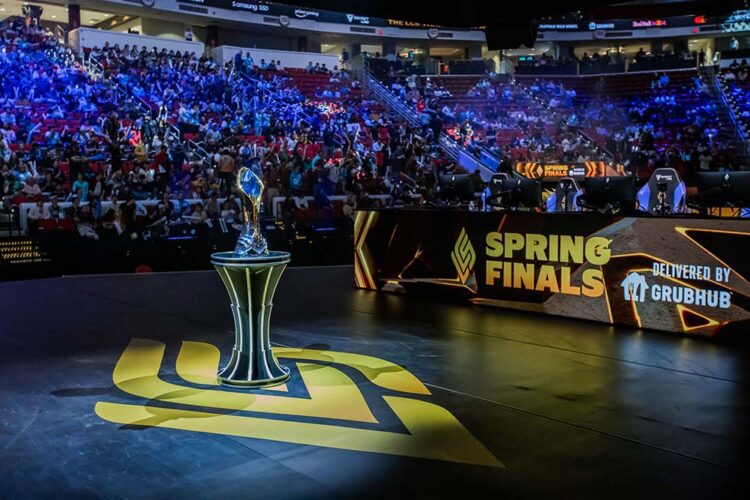Esports holds long-term financial viability at League of Legends and Valorant developer Riot Games, according to John Needham, President of Esports at Riot. In a blog post published Wednesday, Needham outlined the developer’s esports assets roadmap. While his full blog post, “Building the Future of Sport at Riot Games: Economics,” can be found on Riot’s blog, The Esports Advocate offers a concise five-minute summary of the key takeaways.
Contrary to using esports as a marketing tool for acquiring new players, Riot prioritizes building a sustainable business for itself and its partners through its esports assets. The objective is especially important amid discussions of “a looming recession and uncertainty about the business of esports impacting the ability of 100+ pro teams in our League of Legends and Valorant leagues to raise capital and find and retain sponsors,” as Needham put it. Under this premise, he outlined Riot’s development and monetization strategies for its franchised leagues, broadcasts, and fandom.
Franchised Leagues
In response to League of Legends teams’ requests for long-term commitments to facilitate multi-year agreements with sponsors and pro players, Riot introduced franchised leagues in 2017. Teams paid an average entry fee of $10M USD and entered into a revenue-sharing deal with Riot. To afford the franchise fee, teams raised significant capital from investors at high valuations. However, this influx of capital also led to “player salaries growing at a much faster rate than revenues and as a result, pro teams’ cash reserves were quickly depleted,” while the hype around esports began to fade during the global pandemic.
Learning from these experiences, Riot supported its League of Legends team partners by implementing “minimum guarantees on the 50% revenue share to give teams more revenue predictability, accelerated payments owed to teams, deferred and spread out cash payments that teams owe to Riot, and new revenue opportunities.”
Additionally, Riot reduced capital requirements when launching its franchised Valorant esports league, the Valorant Champions Tour (VCT). VCT participants did not pay Riot a franchise fee, instead, they “maintain their slot by investing in marketing activities, producing content for broadcast, activating their fans around VCT events, and supporting their pro players.” In return, VCT teams receive a fixed annual stipend, a percentage of digital sales for esports content, prize pools for participating in our competitions, and incentives for incremental marketing activities beyond basic requirements.
Broadcasts
Needham also hinted at a time when Riot pursued broadcast license deals for its esports assets. Moving away from that approach, it now aims for its esports broadcasts to be omnipresent, with “esports broadcasted non-exclusively on Western streaming platforms.” Instead, Riot is focusing on monetizing its audience directly through its watch platform, which already hosts up to 40% of viewership during major Riot esports events. Consequently, Riot is “developing its watch platform into an advanced commerce platform that we can use to sell digital goods and services directly to our fans through our broadcasts.”
Other aspects of Riot’s broadcasting strategy going forward include providing high-quality content for viewers interested in improving their gameplay, expanding co-streaming programs, and encouraging game influencers and streamers to explain game fundamentals. Riot has also partnered with Nielsen to provide analytics suitable for sponsors tracking their investments—Nielsen estimated that Riot delivered a 5-7x return on sponsorship.
Fandom
Given the global nature of esports fandom, Riot is shifting its focus to providing fandom experiences that bridge online and in-person engagement because Riot and its partner teams currently have limited ways to monetize their fandom through live events. Starting with Worlds 2023, Riot will test a new product designed to enhance the online viewing experience, bundle products such as in-game items and physical merchandise, and offer more ways for fans to express their enthusiasm and support.
From 2024, Riot plans to introduce a similar offering for VCT and add features to its Worlds product, including access to premium in-game cameras, special cameras around the live event venue, exclusive chat channels and lounges, digital collectibles, and status items like special icons or borders. Riot is developing these products “in a way that we can have team-specific versions.”
In addition to creating new products catering to its fandom, Riot continues to monetize fandom through in-game content such as League of Legends esports-themed skins or the VCT Champions skin pack. Needham revealed that “three out of the top six selling League of Legends skins of all-time are esports-themed and a significant percentage of these sales went back to teams and players,” and Valorant “sold $42 million of the VCT Champions skin pack and distributed half of that revenue to the teams who competed in the tournament.”
